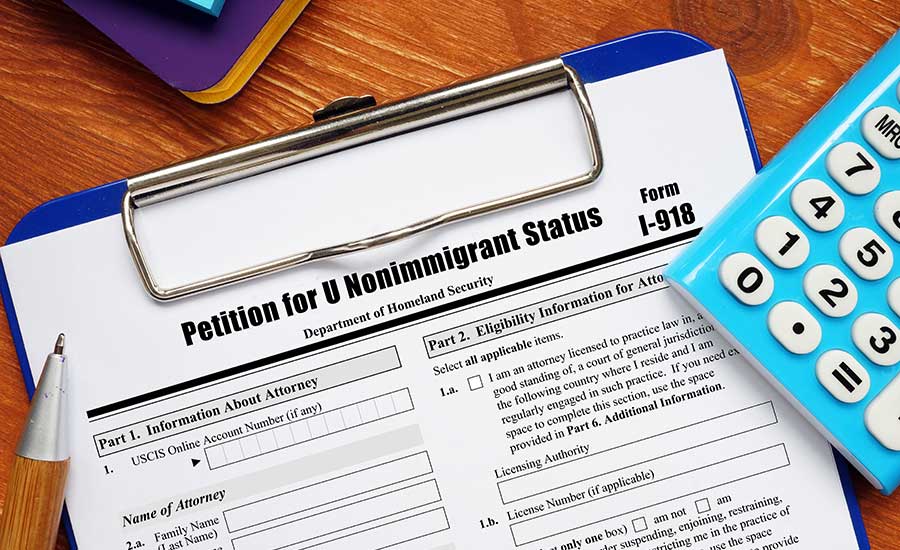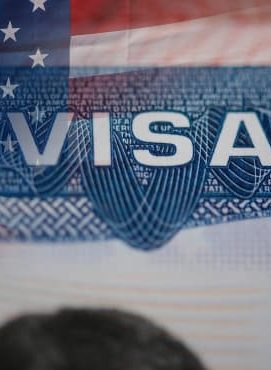

If you’ve been the victim of a serious crime in the United States without legal status, it can feel incredibly overwhelming.
Beyond the physical and psychological trauma, you might be facing the risk of deportation, adding even more stress to an already difficult situation.
The U visa offers protection and the opportunity to remain in the U.S. while helping law enforcement.
We’ll explore how the U visa works, who qualifies, and how to apply, so you have all the information you need moving forward.
What Is A U Visa?
A U visa is a nonimmigrant visa that allows victims of specific crimes to obtain temporary legal status and remain in the U.S., provided they help law enforcement with the investigation or prosecution of the crime.
The U visa was created to:
- Protect victims of crimes such as human trafficking or sexual assault
- Encourage cooperation with law enforcement without the fear of deportation
Although it does not grant permanent residency immediately, U visa holders may apply for an EAD work permit upon USCIS’s preliminary review of the application to ensure it is Bonafide and if USCIS determines that the applicant appears to be eligible for the U visa benefit.
Upon approval of the U visa, the applicant will be eligible to apply for a Green Card in three years.
However, it’s crucial to note that the applicant can apply for a Green Card only after meeting specific requirements. This underscores the need for careful planning and preparation by an experienced U visa lawyer like the attorneys at the Law Offices of Spar & Bernstein.
Depending on the victim’s age, their family members, including spouses, children, and parents, may be eligible for a derivative U visa. Read more about principal applicant vs. derivative applicant in our recent article.
There is an annual cap of 10,000 U visas that can be granted each fiscal year (from October 1 to September 30 of the following year).
Who Qualifies For A U Visa?
To qualify for a U visa, applicants must meet several specific criteria:
- Victim of a qualifying crime: They must have been a victim of a crime that is on the list of criminal activities qualifying for a U visa — for example, abduction, sexual assault or exploitation, human trafficking, kidnapping, stalking or unlawful criminal restraint.
- Significant harm: They must have experienced substantial physical or mental abuse as a result of the crime.
- Cooperation with law enforcement: They must be willing to assist or have already helped law enforcement authorities in investigating the crime or prosecuting the accused.
- Crime occurred in the U.S.: The crime must have taken place in the U.S., or violated U.S. laws, even if the victim is from another country.
- Admissibility: The applicant must be admissible to the U.S., meaning they do not fall under categories that would bar them from receiving a visa — for example, having a criminal history or immigration violations. In some cases, applicants may qualify for a waiver, allowing them to obtain a visa even if certain factors would typically make them ineligible.

How To Apply For A U Visa
The application process for a U visa involves several important steps.
1. Determine Your Eligibility For A U Visa
Make sure you meet the criteria for a U visa, including being a victim of a listed crime, suffering substantial harm, and assisting law enforcement.
2. Fill In Form I-918
Complete Form I-918, Petition for U Nonimmigrant Status, closely following the filing instructions.
Gather Supporting Documents
Collect all required supporting documents, such as:
- Proof of the crime and your involvement — for example, police reports detailing the crime or records indicating your involvement in the investigation or prosecution, such as court records or witness statements.
- Evidence of the harm you suffered — for example, photos and medical records showing your physical injuries, psychological evaluations, or statements from family members and witnesses.
- Form I-918, Supplement B, U Nonimmigrant Status Certification — a document from law enforcement confirming your cooperation with the investigation or prosecution. Ensure you understand and stick to the Supplement B filing instructions.
- Form I-918, Supplement A, Petition for Qualifying Family Member, if you are seeking derivative U visa status for certain qualifying family members such as a spouse and children.
4. Submit Your Petition
Mail your completed Form I-918 and supporting documents to the U.S. Citizenship and Immigration Services (USCIS).
USCIS Nebraska Service Center
For U.S. Postal Service (USPS):
USCIS Nebraska Service Center
Attn: I-918
PO Box 87918
Lincoln, NE 68501-7918
For FedEx, UPS, and DHL deliveries:
USCIS Nebraska Service Center
Attn: I-918
850 S St.
Lincoln, NE 68508
5. Attend A Biometrics Appointment
Once USCIS receives your application, you will be scheduled for a biometrics appointment to provide fingerprints, photos, and other information.
This information will be used to verify your identity and conduct background checks, ensuring security and accuracy in the U visa application process.
6. Await The USCIS Decision
USCIS will review your petition and may request additional information or an interview. The process may take anywhere from several months to over a year.
7. Receive The Decision
USCIS will notify you of their decision.
- If your U visa petition is approved, you will receive a U visa and can stay in the U.S. for up to four years.
- If your U visa petition is denied, you can appeal the decision or explore other options.
8. Apply For Adjustment Of Status (Optional)
If you are granted a U visa and have met all requirements for permanent residency, you may apply for an adjustment of status to obtain lawful permanent residency (a Green Card) after maintaining three years of continuous lodging in the U.S.
If you’re feeling overwhelmed or unsure of where to start — especially given the emotions you’re already experiencing — don’t hesitate to reach out to the knowledgeable and compassionate attorneys at Spar & Bernstein.
Our team will provide the support and guidance you need, helping you feel more confident about your next steps.

What Is The Processing Time For A U Visa?
Due to the high demand, processing times for a U visa can vary, with 80% of cases taking approximately 57 months. You can track changes in processing time on the USCIS website.
USCIS prioritizes backlog petitions and reviews them based on their filing date.
For the 2024 fiscal year, the annual cap for U visas has been reached as of July 22, 2024.
Beginning October 1, 2024, USCIS will resume approving new U visa petitions starting with those filed on or before November 30, 2016. Although the cap for 2024 has been met, USCIS will continue to review petitions and place some on a waiting list.
How Much Does It Cost To Apply For A U Visa?
There is no fee for filing:
- Form I-918
- Form I-918, Supplement A
- Form I-918, Supplement B
However, there may be further costs associated with additional forms like waivers, biometrics (fingerprinting) or legal assistance if you choose to work with an attorney.
Need Help With Your U Visa? Contact Spar & Bernstein
With long-standing experience in immigration law spanning over 60 years, The Law Offices of Spar & Bernstein provide legal guidance every step of the way during your U visa application process.
Our knowledgeable and compassionate team understands that applying for a U visa can be both complex and emotionally challenging — that’s why we take the time to listen to your unique story and address your specific needs with empathy and care.
We handle all aspects of the U visa application, from gathering crucial evidence to preparing and filing your paperwork, helping you address any obstacles along the way to obtaining legal status.
By working closely with you, we aim to relieve some of the stress associated with the U visa application process, allowing you to focus on your recovery and cooperation with law enforcement.
In addition to U visa assistance, we can guide you through the Green Card application process when you become eligible, helping you achieve long-term stability and peace of mind in the U.S.
Check out some of our immigration success stories and give us a call to become one of the people we have helped establish a life in the U.S.
FAQs About A U Visa
To address common concerns and provide more clarity on the U visa process, here are answers to frequently asked questions.
What happens if the annual U visa limit is reached?
If the annual cap of 10,000 U visas is reached, USCIS will place eligible applicants on a waiting list and resume processing their applications once new visas become available in the next fiscal year.
Can I travel outside the U.S. while on a U visa?
Traveling outside the U.S. on a U visa is risky and may result in you losing your status. Talk to our immigration lawyers at Spar & Bernstein before making travel arrangements.
What happens to my U visa if I get divorced?
If you are the principal U visa holder, a divorce will not affect your status. However, if you are a derivative family member (spouse), your legal status could be impacted by a divorce. Schedule a consultation with our team at Spar & Bernstein to understand your options.





